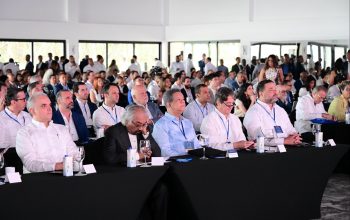news
Present Latin American Context and Perspectives
September 20, 2007
Global Foundation for Democracy and Development (GFDD) and Fundación Global Democracia y Desarrollo (FUNGLODE) in association with Georgetown University’s Center for Latin American Studies and the Edmund A. Walsh School of Foreign Service organized a presentation and discussion session with Dominican President, Leonel Fernández, Tuesday, September 18, 2007, from 3:00 pm – 4:00 pm, at Georgetown University.
 President Leonel Fernández was welcomed and introduced by Georgetown President, John J. DeGioia, and Professor and Director of Georgetown’s Center for Latin American Studies, Arturo Valenzuela.
President Leonel Fernández was welcomed and introduced by Georgetown President, John J. DeGioia, and Professor and Director of Georgetown’s Center for Latin American Studies, Arturo Valenzuela.DeGioia emphasized President Fernández and
Georgetown’s common commitment to increasing cross-cultural understanding and establishing conditions that enable human development.
Georgetown’s common commitment to increasing cross-cultural understanding and establishing conditions that enable human development.
In his presentation, “Present Latin American Context and Perspectives,” the two-term Dominican President argued that current challenges to sustainable development in Latin America must be understood within a historical context. He posited that fundamental ties have existed
between democratic and economic stability, asserting that previous periods of democratic instability have prevented nations from achieving substantial social and economic gains.
between democratic and economic stability, asserting that previous periods of democratic instability have prevented nations from achieving substantial social and economic gains.
Prior to regional independence in 1978, a primary goal of Latin American nations was to break away from authoritarian rule and establish democratic regimes. During much of the 19th and 20th centuries, the US style of governance served as a model for democratic
governance throughout Latin America. However, according to President Fernández, the precapitalist nature of Latin American societies at the time did not allow for the successful adoption and implementation of US democratic principals.
governance throughout Latin America. However, according to President Fernández, the precapitalist nature of Latin American societies at the time did not allow for the successful adoption and implementation of US democratic principals.
Lack of confidence in government institutions fueled social revolutions in various nations throughout the Hemisphere during the 20th century. Socialist-based revolutions in Mexico (1910), Cuba
(1959), Nicaragua (1979) and the Dominican Republic (1961), in conjunction with the collapse of dictatorial regimes in France, Spain, Portugal and Greece in the 1970s, demonstrated that the overthrow of authoritarian regimes was not an unattainable aspiration, but rather an achievable goal. Moreover, the human rights movements gaining strength in Chile and Brazil during the 1970s and the foreign policy strategy of US President Jimmy Carter greatly impacted politics in Latin America,
prompting free and fair elections.
(1959), Nicaragua (1979) and the Dominican Republic (1961), in conjunction with the collapse of dictatorial regimes in France, Spain, Portugal and Greece in the 1970s, demonstrated that the overthrow of authoritarian regimes was not an unattainable aspiration, but rather an achievable goal. Moreover, the human rights movements gaining strength in Chile and Brazil during the 1970s and the foreign policy strategy of US President Jimmy Carter greatly impacted politics in Latin America,
prompting free and fair elections.
 |
 |
President Fernández maintained that despite under-going political transition, democratic regimes in the Region have not been able to produce significant social and economic outcomes. He argued that in order for Latin American administrations to adequately address the social and economic needs of their citizenry, they must implement measures that are neither purely state-centric, nor neoliberal in nature, stressing that alone, neither
strategy has the capacity to achieve wide-scale socio-economic change.
strategy has the capacity to achieve wide-scale socio-economic change.
Evidence indicates that while market-driven policies have contributed to GDP growth, they have also been accompanied by increased economic disparity. Presently, 96 million people in Latin America live in conditions of extreme poverty. W






